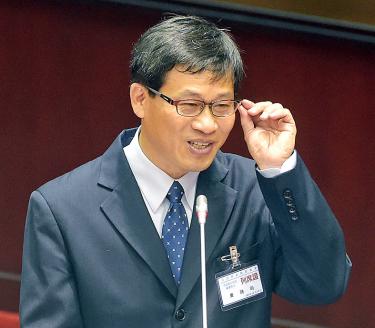Grand justice nominee Remington Huang (黃瑞明) yesterday promised to recuse himself from the constitutional interpretation cases filed by his wife, Democratic Progressive Party (DPP) Legislator Yu Mei-nu (尤美女), and not to seek reappointment when his term ends amid growing public distrust of the judiciary.
Huang, an attorney at the law firm Baker and McKenzie, proposed changes to the judiciary to improve efficiency, diversify judicial appointments and introduce a lay judge system at a legislative review of the grand justice nominees.
Judicial reforms need to address the tendency of lawyers and prosecutors to launch unnecessary litigation; to recruit experienced lawyers as judges to prevent the appointment of so-called “dinosaur judges” that are out of touch with society; and ensure that local courts can conduct trials more thoroughly, he said.
Huang expressed support for a variety of issues, including same-sex marriage, decriminalization of adultery, legalizing euthanasia, abolishing the death penalty and lowering the minimum voting age, but declined to answer questions involving political judgements, such as whether Taiwan is a “normal country,” whether the so-called “1992 consensus” is constitutional, whether a new Constitution is needed and whether it is unconstitutional for President Tsai Ing-wen (蔡英文) to chair High-level Policy Coordination Meetings with the Cabinet, lawmakers and local government chiefs.
Amid controversy surrounding the nomination of former grand justice Hsu Tzong-li (許宗力) as Judicial Yuan president, Chinese Nationalist Party (KMT) Legislator Lu Shiow-yen (盧秀燕) questioned whether Huang would accept reappointment after his term expires, as the law stipulates that grand justices cannot serve continuous terms, but does not specify if they can serve a second term.
“I can promise that I will not [seek reappointment]. This will be noted in the records,” Huang said.
He would be nearly 70 at the end of his term and would be unsuitable to assume the responsibilities, Huang said, adding that Hsu’s nomination is not unconstitutional.
In response to a question from KMT Legislator Chiang Wan-an (蔣萬安) about whether he could remain impartial when handling petitions for constitutional interpretations lodged by Yu, Huang said he would recuse himself from cases submitted by Yu and his former clients.
However, Huang said there is no need to recuse himself from petitions seconded by Yu according to the law, because such petitions are collectively launched by lawmakers.
Chiang said that public trust of the judiciary can hardly be regained if Huang could not exercise the highest ethical standards and distance himself from cases involving his spouse.
Huang said that the constitutional right to equality and non-discrimination should be extended to same-sex couples, and the Civil Code could be inadequate in protecting the rights of homosexuals if it only recognizes heterosexual marriages.
“The Civil Code apparently only recognizes marriage as being between a man and a woman, which does not take the rights of homosexuals into consideration,” he said.
Amending the law is the best way to eliminate legal hurdles for same-sex couples while a constitutional interpretation is a viable alternative, he added.
The so-called “1992 consensus,” a term former Mainland Affairs Council chairman Su Chi (蘇起) admitted to making up in 2000, refers to a tacit understanding between the KMT and the Chinese government that both sides of the Strait acknowledge there is “one China,” with each side having its own interpretation of what “China” means.
Source: Taipei Times - 2016/10/20





















